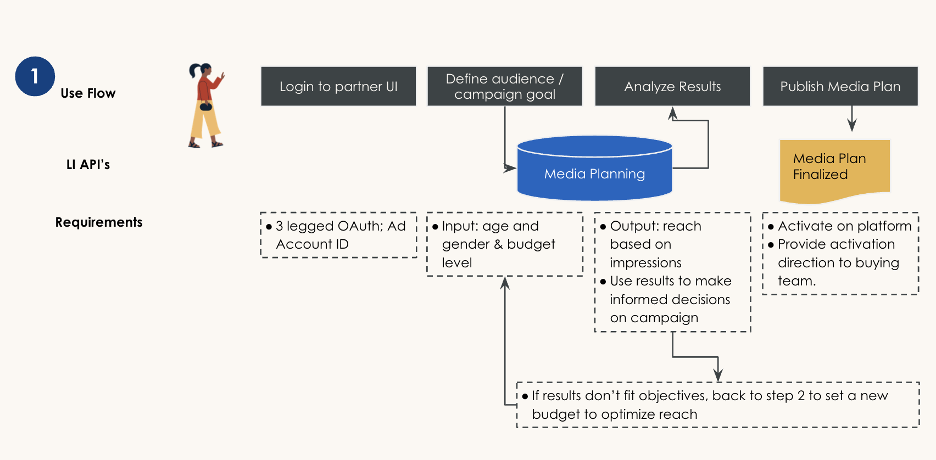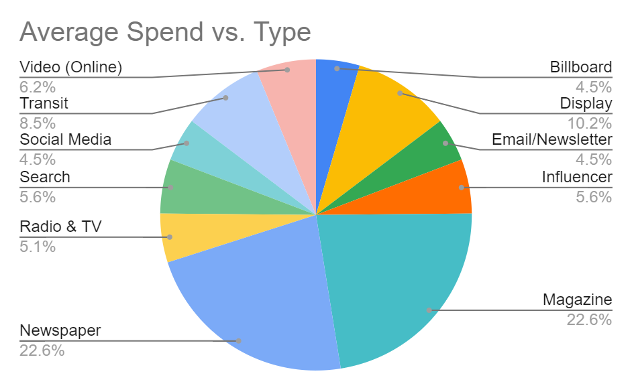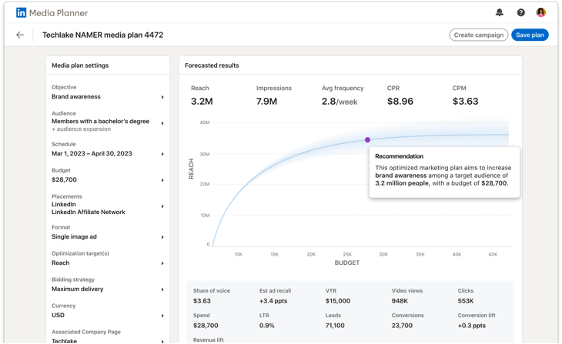Media Planning API Use Cases
Warning
Deprecation Notice
The Marketing Version 202401 (Marketing January 2024) has been sunset. We recommend that you migrate to the versioned APIs as well as migrate to the new Content and Community Management APIs to avoid disruptions. See the Migration page for more details.
If you haven’t yet migrated and have questions, submit a request on the LinkedIn Developer Support Portal.
LinkedIn's Media Planning API enables marketers to understand investment delivery against valuable audiences and objectives.
Why?
LinkedIn's Media Planning API enables marketers to understand investment delivery against valuable audiences and objectives. By leveraging this API, marketers can forecast the reach, impressions, and potential leads of their campaigns before committing to a budget. This allows for more informed decision-making and optimized budget allocation. The API provides detailed insights into how different audience segments respond to various marketing strategies, helping marketers to fine-tune their campaigns for maximum effectiveness. Additionally, the Media Planning API supports cross-channel planning, enabling marketers to integrate LinkedIn's data with other advertising platforms for a comprehensive view of their marketing efforts.
Marketers need:
- To understand target audience reach across channels to accurately forecast business outcomes
- Right data to forecast against the specific buying groups and lower-funnel actions vital to success in B2B and/or high-consideration B2C
- The ability to test different budget scenarios to optimize their media plans against desired outcomes
Permissions
Media Planning API Permissions
Prerequisites
- Your developer application has access to LinkedIn Advertising APIs. If you are new to our APIs, get started by applying for Advertising API access.
- Your developer application needs to be provisioned with the Media Planning API product.
- You have access to atleast one ad account with one of the below roles:
ACCOUNT_BILLING_ADMINACCOUNT_MANAGERCAMPAIGN_MANAGERCREATIVE_MANAGERVIEWER
For more information on Ad Account roles and permissions:
Example User Process Flow - Media Plan for Brand Planning
Media Planner and/or buyer received a new campaign brief. Media Planner logs into planner tool built with LinkedIn APIs and navigates to the LinkedIn Media Planning module to begin validating the campaign brief. Planner inputs include age, gender, location criteria, and so on. The module produces a reach curve that planner is able to estimate the reach and frequency of multiple budget levels to optimize for highest ROI on LinkedIn. From there, planner can allocate budget to the platform and activate their holistic marketing plan.

Use Case 1: Brand Planning/High-level Channel Planning
Plan based on key upper-funnel metrics to assist clients in managing their category and increasing their brand equity. Use LinkedIn Data to compare reach across other investment channels (e.g., social, video) accurately. Required inputs: high-level budget, audience (e.g., sourced from LinkedIn Audience API), or geo location, demographic data.
Flexibility to choose which inventory you want to forecast against:
- LinkedIn feed only “Social Media”
- LinkedIn LAN “Display”
- LinkedIn CTV “TV / Video (online)”

Step 1: Perform 3L OAuth Flow
If there is no valid existing member token for the relevant user from any previous integration, we recommend using the bare minimum scope permissions like r_ads which will be required to fetch authenticated user's ad accounts.
For more information on generating 3L OAuth token, see 3L OAuth Token.
Step 2: Retrieve all LinkedIn Ad Accounts
Retrieve all LinkedIn Ad Accounts for the end user to choose one to further use with LinkedIn Media Planning APIs. The selected ad account should be then passed to subsequent API requests metadata.
For more information on retrieving ad accounts, see Retrieve Ad Accounts.
Step 3: Forecast Reach/Impression/Leads for Brand Planning
Use the ad account from the previous step to forecast reach, impressions, and leads. Age, gender, location, and campaign objectives (BRAND_AWARENESS, VIDEO_VIEW or LEAD_GENERATION) will guide high-level planning.
For more information on targeting capabilities, see:
- targetingCriteria object
- Descriptive examples for targetingCriteria object
- List of supported adTargetingFacets in targetingCriteria object
- Ad Targeting Entities
For more information on forecasting with Media Planning API, see documentation.
Use Case 2: Full-Funnel/ B2B Professional Audience Planning
Use LinkedIn Data to forecast any Professional audience accurately. This planning takes input of LinkedIn Professional audiences like IT Decision Makers, Campaign Objectives, Ad Formats, etc., and helps clients plan full-funnel metrics (reach, impressions, leads, etc.) for every stage of the marketing funnel by defining B2B audiences.

Step 1: Perform the 3L OAuth Flow
If there is no valid existing member token for the relevant user from any previous integration, we recommend using the bare minimum scope permissions like r_ads which will be required to fetch authenticated user's ad accounts.
For more information on generating 3L OAuth token, see 3L OAuth Token.
Step 2: Retrieve all the LinkedIn Ad Accounts
Retrieve all LinkedIn Ad Accounts for the end user to choose one to further use with LinkedIn Media Planning APIs. The selected ad account should be then passed to subsequent API requests metadata.
For more information on retrieving ad accounts, see Retrieve Ad Accounts.
Step 3: Forecast Reach/Impression/Leads
Use the ad account from the previous step to forecast reach, impressions, and leads. For B2B professional audience forecasting use LinkedIn’s rich B2B targeting facets like interests, job title, seniority, job function, industries, firmographic facets etc., in addition to age, gender, location.
For more information on targeting capabilities, see:
- targetingCriteria object
- Descriptive examples for targetingCriteria object
- List of supported adTargetingFacets in targetingCriteria object
- Ad Targeting Entities
For information on audience segment size, see documentation. For more information on forecasting with Media Planning API, see documentation.